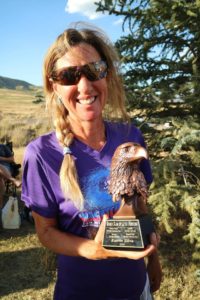
Last summer, I earned an eagle trophy for finishing the four oldest US-based 100-mile races in the same season, which took me 101 hours and change. This adventure, also known as the Grand Slam of ultra running, had been on my bucket list for years. It wasn’t a walk in the park, but it was worth every bit of sweat, dirt and pain. I will never forget these 400 miles, with all their highs, lows, and belt buckles.
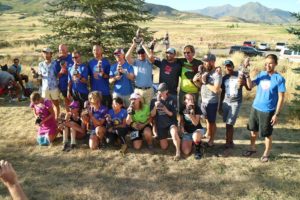
Seventeen of us finished last year. Wow, what a ride!
It’s June 1st, which means a new crop of Grand Slam hopefuls is about to start going after that eagle. Part of me feels relieved I’m not doing it again, but another part feels a twinge of envy. I’m signed up for Bighorn and Leadville, but I won’t run 400 miles in 56 days like last year. I do have a few bits of wisdom to share with those of you who will, though:
- Start the summer really, really rested
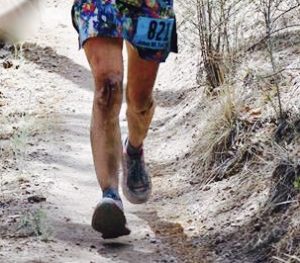
My legs at the finish of the Jemez 50-miler. Don’t beat yourself up like this four weeks before the Grand Slam. Please be smarter than I was!
I decided to run the Jemez 50-miler four weeks before Western States as a training effort, then ended up racing as hard as I could. After Jemez, I kept training until about ten days before Western States, which, in retrospect, was my worst Grand Slam performance. Be smarter than that. Run tune-up races as long training runs instead of going all out. Taper longer than you normally would for a 100-miler. Get more sleep. Use your foam roller. Take your vitamins. Do everything you can to give your body every possible advantage before your first of the four 100s.
2. Slamming takes more time than you think
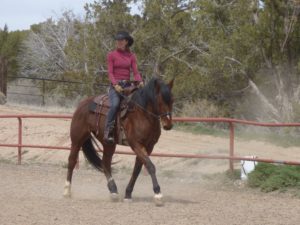
My day job. Putting those boots back on after every 100 was the hardest part of the Grand Slam.
This is true for training, race planning, traveling, and recovery. Your body will feel tired like never before. So will your brain. The Grand Slam will take over your life. It’s best to accept this instead of trying to keep up a normal schedule. I am lucky because I work as a self-employed horse trainer, with loyal and supportive clients who did not begrudge me the extra days off I needed to run all these 100s. Even so, the hardest part of each race was putting my boots back on my blistered feet a day or two after each race and getting my aching body back in the saddle. Be ready to work as much as you have to, run a lot, drive a lot, rest a lot, eat a lot, and do little else. Be ready to keep your drop bags and piles of ultra supplies on your living room floor all summer, because you barely have enough time to re-label and re-pack them between races. Be ready to cut almost everyone and everything other than the Grand Slam out of your life, e.g. netflix, dinners out, domestic chores, and friends and family members who are not part of your crew.
2. It takes a village – but a small one.
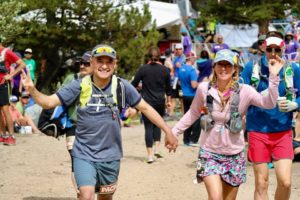
Ultra husband David Silva, here at Leadville, ready to pace me over Hope Pass. The Grand Slam is a bonding experience.
Sharing the Grand Slam journey with my husband David and my friend Tammy was one of the highlights of last summer. You, too, will need a crew, but don’t get carried away. Too many crew members can make race organization more complicated than it has to be. Two people are an ideal number, especially in point to point races like Wasatch and Western States, because one will need to drive the car while the other paces you. You and your crew will spend lots of time in cramped quarters, like hotel rooms and rental cars. Because of this, choose people who get along with you, and with each other – everything else is secondary. Once you’ve picked your crew, treat them like the saints they truly are. Thank them every chance you get. Without a support system, your Grand Slam goal becomes much harder to reach. With the right people around you, it still won’t be easy, but you’ll enjoy the experience a lot more.
3. It’s a 400-mile race, not four 100-mile races
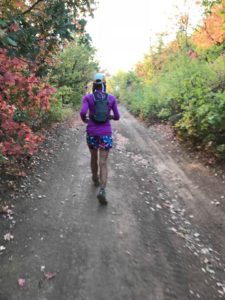
Almost there! Mile 95 at Wasatch, or mile 395 of the Grand Slam.
Normally, i.e. when not grand slamming, the difference between racing and training runs is to leave everything out on the course vs. being able to run the next day. The Grand Slam means you have to tweak this way of thinking. It’s still a race, but it happens in four stages. Run hard, but not so hard you can’t recover in time for the next part. Think of the final goal, which is the eagle and all four buckles, not just one buckle. While you’re running the first three races, think of the finish line at Wasatch as the one you want to reach. Pace yourself accordingly.
4. Be ready to roll with the unexpected
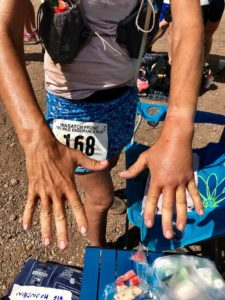
A wasp sting at mile 5 of the Wasatch 100 slowed me down, but did not stop me. Just remember to loosen your gps watch if this happens to you.
If you DNF once, you will DNF the Grand Slam, which means no eagle trophy. You want to finish each race, in spite of the inevitable mishaps that will happen and the mistakes you will make. At Wasatch, I put my tights into the wrong drop bag, so I borrowed a pair from an aid station volunteer and continued. Be prepared to have a plan B for everything. Be prepared to eat what appeals to you instead of what you had planned, be prepared for missed pacer connections, be prepared for retracing your steps if you get off course. Have a plan, but also have a plan B. You will need it.
7. Air travel adds a new level of challenge
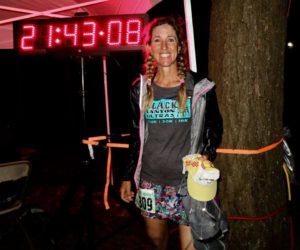
Vermont. I did ok, without lugging a hatchback full of supplies.
The Grand Slam is spread out all over the country, so be prepared to fly to at least one 100-mile race. This takes additional planning and will force you to make some hard choices. I’ve always run ultras within driving distance, because I enjoy road trips, and also because my little hatchback easily holds the astonishing amount of stuff I need, or think I need, to run 100 miles. Air travel will force you to rethink your drop bag strategy. You will find that you need less stuff than you usually take along, but even so, it’s a good idea to pay the exorbitant fee for an extra suitcase.
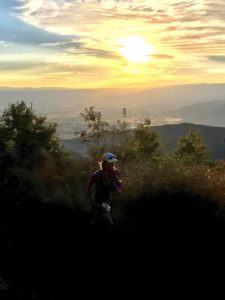
The second sunrise. Savor theoe moments.
But when I finally crossed the finish line at Wasatch, when I finally got to hold that eagle trophy, when I finally could rest, I found I didn’t really want to. The most important lesson I learned was this: the human body is way more resilient than we think. As the summer went on, recovery became easier instead of harder. I felt progressively stronger, instead of more and more run down. This came as a complete surprise. Wasatch, 19 days after a respectable Leadville finish, was my last and best race. I realized that one 100-mile race is good training for another. So, feel confident. The Grand Slam will push you to your limits, but you will find that those limits are much more elastic than you might believe. Use the Grand Slam as an opportunity to explore what your body, mind, and spirit can do. Ken Chlouber, in his famous pre-Leadville speech, is spot on: You can do more than you think you can, and you are tougher than you think you are.
Really.
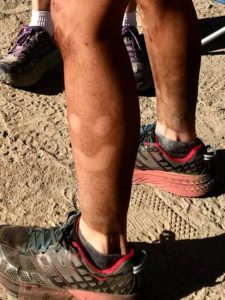
Above everything else, run happy.
Run smart, run strong, and enjoy the journey!
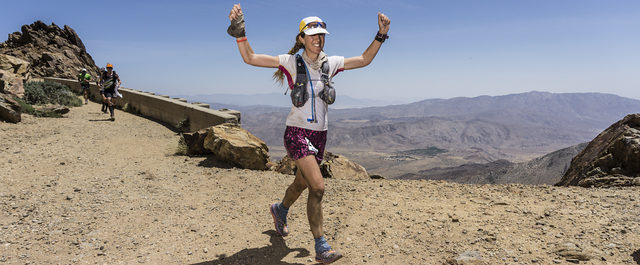

Good job Katrin. I totally admire your determination. You and David are my idols. At 66, I no longer run but I walk just as much, take a little longer but I have all the time in the world. Biking and swimming also. Be safe out there………..♂️♀️❤️
Thank you, Juez! You are our idol. I hope to be as fit as you when I’m your age!
Wonderfull written! So inspiring! <3
Thank you, Lupita!
What a great journey it was last summer. Thank you for letting me be part of it! If you ever need crew I am here. See you soon.
See you in just a few days! I look forward to sharing Bighorn with you, mud and all.